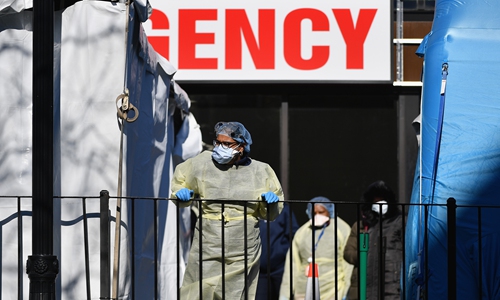HOME >> OPINION
US political elites attempt to save economy before people’s lives
By Zhang Tengjun Source:Global Times Published: 2020/3/28 18:48:40

Medical workers look out of the Elmhurst Hospital Center in Queens, New York on Thursday. Elmhurst reported 13 COVID-19 patients died at the hospital in a 24-hour span, according to local officials. The US has had more confirmed coronavirus cases than any other country as of Friday. Photo: AFP
The confirmed COVID-19 cases in the US have surpassed that of China, making the former the country with the most infections in the world. In such a grim epidemic situation, US President Donald Trump said Tuesday that he hopes to "have the country opened up" by April 12, Easter Sunday. The plan obviously places political interests above the health of millions of Americans.In China, with strong leadership and execution from the central to the local level, the government has been devoted to epidemic containment at all costs, even at the expense of economic interests, to protect its people from harm of the virus. In contrast, in the US, many politicians in power care more about their own short-term benefits - such as whether they can be re-elected or not, and always put their personal interests above the health and even lives of Americans.
Since the epidemic has spread in the US, most of the Trump administration's containment measures have been made out of consideration of their political agendas.
Initially, the Trump administration's strategy was to guard by all means against any negative impact on the US economy and society that the outbreak could possibly have, as the public's panic might adversely affect his polls. Specifically, he played down the epidemic risks and dealt with the outbreak in a very slow manner. Various problems, such as poor internal coordination and a serious shortage of test kits, have surfaced and thus made the country lose valuable time. His government's response at that stage were basically a dereliction of duty.
As the outbreak began to spin out of control, many US states started to take action. And the Trump administration finally adopted some strong measures, such as declaring a national emergency, releasing an economic stimulus plan, and issuing 15-day social distancing guidelines. These steps were more likely forced by the changes in the situation, and most importantly, the turbulence in the stock market. The meltdown sounded an alarm for Trump, making him realize that a slow response will only hurt the economy, and then his re-election.
The number of confirmed COVID-19 infections in the US topped 100,000 on Friday, with a daily increase of more than 10,000 for several days. Trump's eagerness to ease the social distancing guidelines at this time exposes the dilemma he faces: It is hard to walk a fine line between curbing the epidemic and saving the economy.
On the one hand, if the virus continues to spread rapidly, Americans will lose confidence in him. On the other, if he takes extreme measures, even if the epidemic is brought under control fairly quickly, the economy will suffer, and his popularity will languish, as economic growth and the stock market used to be at the heart of Trump's chances.
Some in the US have been calling for a lockdown of the entire country and a suspension of most economic activities. But the Trump administration is obviously reluctant to go that far. The President's plan is likely a test of public opinion, checking if it is possible to undo the economic damage and support his re-election.
However, Trump's Easter deadline has already drawn criticism from local officials and is very unlikely to be realized. New York Governor Andrew Cuomo said, "If you ask the American people to choose between public health and the economy then it's no contest, no American is going to say accelerate the economy at the cost of human life because no American is going to say how much a life is worth." At the current stage where many US states are in a state of emergency, Trump's call for resumption of work will hardly get a response. At most, some government agencies and institutions at the federal level might recover at Trump's request.
The author is an assistant research fellow at the China Institute of International Studies. opinion@globaltimes.com.cn
RELATED ARTICLES:
Posted in: VIEWPOINT